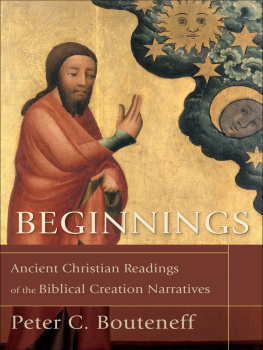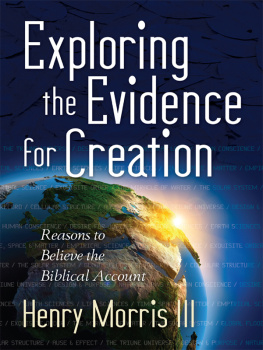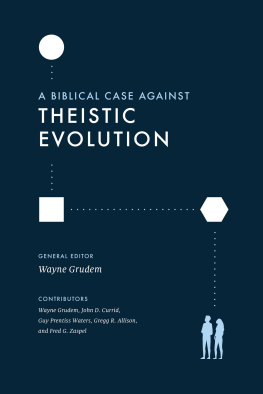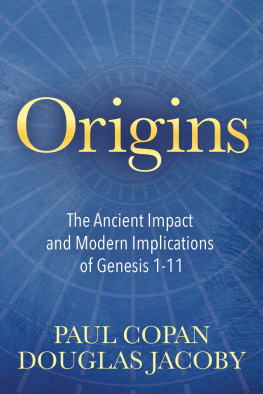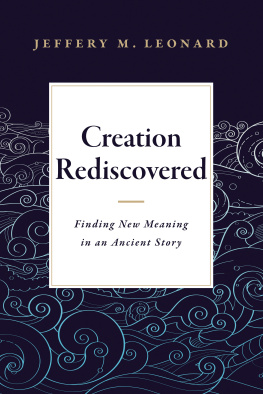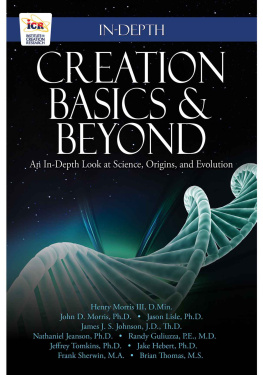Peter C. Bouteneff - Beginnings: Ancient Christian Readings of the Biblical Creation Narratives
Here you can read online Peter C. Bouteneff - Beginnings: Ancient Christian Readings of the Biblical Creation Narratives full text of the book (entire story) in english for free. Download pdf and epub, get meaning, cover and reviews about this ebook. year: 2008, publisher: Baker Publishing Group, genre: Religion. Description of the work, (preface) as well as reviews are available. Best literature library LitArk.com created for fans of good reading and offers a wide selection of genres:
Romance novel
Science fiction
Adventure
Detective
Science
History
Home and family
Prose
Art
Politics
Computer
Non-fiction
Religion
Business
Children
Humor
Choose a favorite category and find really read worthwhile books. Enjoy immersion in the world of imagination, feel the emotions of the characters or learn something new for yourself, make an fascinating discovery.
- Book:Beginnings: Ancient Christian Readings of the Biblical Creation Narratives
- Author:
- Publisher:Baker Publishing Group
- Genre:
- Year:2008
- Rating:4 / 5
- Favourites:Add to favourites
- Your mark:
- 80
- 1
- 2
- 3
- 4
- 5
Beginnings: Ancient Christian Readings of the Biblical Creation Narratives: summary, description and annotation
We offer to read an annotation, description, summary or preface (depends on what the author of the book "Beginnings: Ancient Christian Readings of the Biblical Creation Narratives" wrote himself). If you haven't found the necessary information about the book — write in the comments, we will try to find it.
Beginnings: Ancient Christian Readings of the Biblical Creation Narratives — read online for free the complete book (whole text) full work
Below is the text of the book, divided by pages. System saving the place of the last page read, allows you to conveniently read the book "Beginnings: Ancient Christian Readings of the Biblical Creation Narratives" online for free, without having to search again every time where you left off. Put a bookmark, and you can go to the page where you finished reading at any time.
Font size:
Interval:
Bookmark:
Beginnings meets a precise need in patristic studies and in the history of early Christian biblical interpretation: the need for a historically astute, theologically sympathetic, and hermeneutically sophisticated analysis of the fathers reading of Genesis 13. Here at last is a work that truly sets in relief the many layers of meaning that patristic commentators saw in these rich and evocative opening chapters of the Bible. Rather than dismissing their work as premodern, prescientific groping for a valid explanation of the stories of creation and fall, Bouteneff definitively demonstrates the profound theological contextualiza-tion at work in early Christian exegesis of the Genesis cosmogony. This is a superb monograph.
Paul Blowers, Dean E. Walker Professor of Church History,
Emmanuel School of Religion
I hope this remarkable study will be widely read and appreciated. From the start, the reader is obliged to grapple with questions about how a text is to be read when it can be demonstrated that layers of subsequent interpretation have had as much, if not more, influence than the text itself. And what more crucial text is there than Genesis 13, which has shaped Christian understanding of both creation and fall in ways that are now controversial, both within the churches and in the public domain? Though not always agreeing with the analyses presented here, I can guarantee that hardly anyone, whatever their starting point, will come away from this book without having found some new insight.
Frances M. Young, Edward Cadbury Professor of Theology,
retired, University of Birmingham
BEGINNINGS
BEGINNINGS
Ancient Christian Readings
of the Biblical Creation Narratives
Peter C. Bouteneff

2008 by Peter C. Bouteneff
Published by Baker Academic
a division of Baker Publishing Group
P.O. Box 6287, Grand Rapids, MI 49516-6287
www.bakeracademic.com
Printed in the United States of America
All rights reserved. No part of this publication may be reproduced, stored in a retrieval system, or transmitted in any form or by any meansfor example, electronic, photocopy, recordingwithout the prior written permission of the publisher. The only exception is brief quotations in printed reviews.
Library of Congress Cataloging-in-Publication Data
Bouteneff, Peter.
Beginnings : ancient Christian readings of the biblical creation narratives / Peter C.Bouteneff.
p. cm.
Includes bibliographical references.
ISBN 978-0-8010-3233-2 (pbk.)
1. CreationHistory of doctrines. 2. CreationBiblical teaching. 3. Creationism History of doctrines. 4. CreationismBiblical teaching. I. Title.
BT695.B63 2008 222 .110609015dc22 2008016926
Except where otherwise indicated, all biblical references in English, including those from Wisdom of Solomon and 2 Esdras, are from the New Revised Standard Version of the Bible, copyright 1989, by the Division of Christian Education of the National Council of the Churches of Christ in the United States of America. Used by permission. All rights reserved.
Scripture quotations labeled NETS are taken from the New English Translation of the Septuagint, 2007 by the International Organization for Septuagint and Cognate Studies, Inc. Used by permission of Oxford University Press. All rights reserved.
Contents
And There Was Evening
A Preface
The biblical creation narratives are evocative, authoritative, and important to people of several great religious traditions, and yetlike much of Scripture there are debates and disputes among members of the same tradition and between members of different traditions about how they are to be read and what their narrative details mean. It is all the more difficult to understand them or even to take them seriously in our day, given how much baggage has been laid on them over the centuries by both high art and popular culturefrom the Sistine Chapel ceiling to National Lampoons Adam and Eve. Then there are the politicized debates that pit evolution against creation, categories that an increasing number of people consider simplistic. Theological discourse, too, looks to the creation narratives for answers to more questions than they can possibly bearquestions about the cosmos, humanity, gender, theodicy. It would be useful to see how they were read before the accretion of so many layers of interpretation.
Within the Christian tradition alone, the exegesis of Genesis 13 has a long and varied history. It is worth inquiring how the creation narratives were read when they were first beginning to be considered authoritative foundational texts, particularly by those instrumental in shaping Christian theology. Although this question may be relevant to anyone studying the history of ideas, it is of particular concern to traditions that vest authority in patristic witness. But the evolution of the early Christian interpretation of Genesis 13 is of more than antiquarian interest: like all good history, it has the potential to illuminate the present. In this regard, one feature becomes clear from even a cursory study of this period: we do not find a univocal reading or a single method (which might confound those who would impose a single fixed framework on these narratives). We do, however, find a consistent and coherent pattern of reading, whose theological character is considerably different from the modern mainstream. And even if this pattern cannot be adopted wholesale by contemporary readers of all predilections, it may at least point them to something more substantive, constructive, and meaningful than the results of either atheological modern criticism or overwrought theological analysis.
What do we mean by ancient Christian thought or interpretation? A narrow definition of Christian in the first centuries after Christ no longer suffices. Recent scholars have made a compelling case for expanding the definition of what properly constitutes early Christian theology and practice and for blurring the lines between orthodoxy and heresy. Yet at least for the purposes and scope of the present study, I am mindful of the undeniable divide between the first- and second-century authors who read the Genesis narratives in terms of the God who sent his Son into the world as its unique Savior and those who took Pauls spiritualization of the law as license to construct parascriptural accounts of cosmic origins. The lines that separate Irenaeus and Valentinus are not especially blurry, nor are those between Tertullian and Marcion. The tendency of orthodox writers to exaggerate or distort the positions of their heretical challengers is equally undeniable and significant, but it does not obliterate those categories. Although the study of the totality of the ancient literature is both necessary and fascinating, and although neither mainstream nor marginalized theologies ought to be ignored or short-changed in research, the two still ought to be studied as separate categories. And they generally are: any responsible study of theology in the early Christian centuries will be concerned with hermeneutical questions, their polemical context, and their political and ecclesiastical influences, but we still end up with books on lost Christianities, on different stripes of gnostic and Manichaean writers, as well as on the church fathers.
This book focuses on the last group. After looking selectively at the period when the Genesis creation narratives first resurfaced among hellenized Jewish writers and LXX translators, it surveys Paul and the NT. It then primarily explores the early Christian writers who wrote in Greek during the first four Christian centuries. Tertullianthe sole Western author is included there as well because of the seminal importance of his contribution. These authors whether through a patriarchal conspiracy or the guidance of the Holy Spirit (or some combination thereof)were responsible for the early formation of Christian theology and still resonate among contemporary Christians, in particular those who take early patristic voices seriously: Orthodox, Roman Catholics, and sectors of all the mainline Protestant denominations, Anglicans, free churches, and many evangelicals. Our study ends with the Cappadocian fathers, who represent the first sustained harvest of Origens exegetical ideas.
Next pageFont size:
Interval:
Bookmark:
Similar books «Beginnings: Ancient Christian Readings of the Biblical Creation Narratives»
Look at similar books to Beginnings: Ancient Christian Readings of the Biblical Creation Narratives. We have selected literature similar in name and meaning in the hope of providing readers with more options to find new, interesting, not yet read works.
Discussion, reviews of the book Beginnings: Ancient Christian Readings of the Biblical Creation Narratives and just readers' own opinions. Leave your comments, write what you think about the work, its meaning or the main characters. Specify what exactly you liked and what you didn't like, and why you think so.

